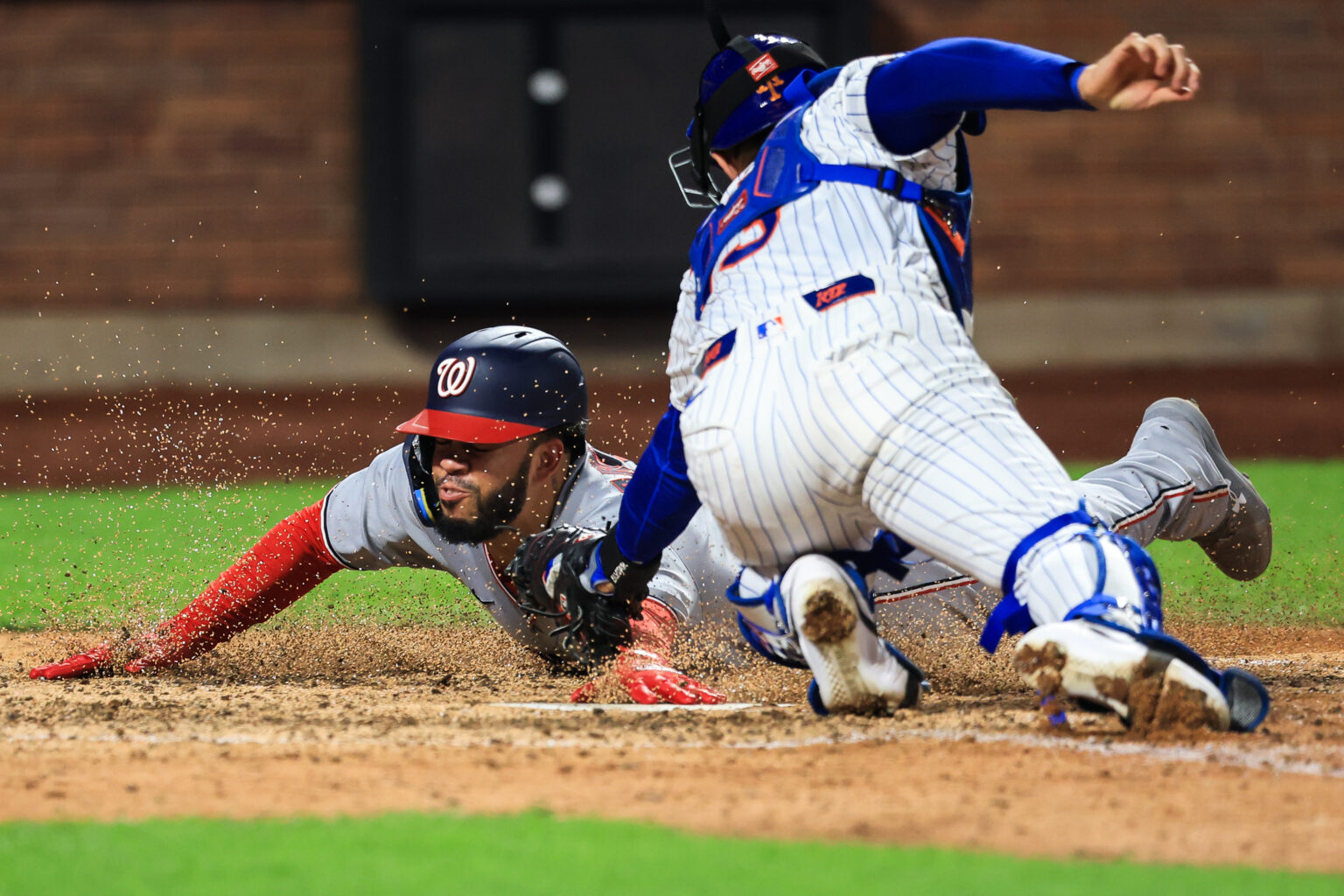Washington Nationals Suffer Defeat at Citi Field: Analyzing the Offensive Struggles and Player Performances
NEW YORK – The Washington Nationals faced a challenging evening at Citi Field, falling 5-0 to the New York Mets, with their offensive efforts falling significantly short. The team managed only six hits throughout the game, predominantly singles, and displayed a tendency to swing prematurely in counts, resulting in limited productive at-bats. The lack of patience and extended plate appearances contributed to their inability to generate runs, highlighting ongoing offensive struggles.
Early and Mid-Game Highlights: Mets’ Dominance and Nationals’ Missed Opportunities
The Mets seized an early advantage against pitcher Jake Irvin, with Pete Alonso driving in the first run via an RBI double in the opening inning. In the third frame, Irvin left a curveball over the middle of the plate, which Juan Soto promptly crushed for a two-run homer, extending the Mets’ lead. Brandon Nimmo added solo home runs in the fifth and seventh innings, further cementing the Mets’ control of the game.
Pitching Insights and Player Reactions
Irvin expressed his frustration post-game, stating, “More than anything, I’m pissed off about it. I’ll use this as motivation to improve and keep working. Disappointed? Absolutely. Concerned? Never.” Despite Irvin’s struggles, the blame for the loss largely rests on the offensive side, as the Nationals’ hitters failed to capitalize on scoring opportunities. In the seventh inning, they threatened with two singles against Mets starter David Peterson but couldn’t push across runs, with Peterson striking out two batters and inducing a groundout to escape the inning. In the eighth, Luis García Jr., who had doubled earlier, was thrown out at home attempting to score on a single by Jacob Young, ending the inning.
Peterson needed only 106 pitches to complete a shutout, lowering his ERA to an impressive 2.49. Irvin pitched five innings on 100 pitches, but the team’s inability to generate offense overshadowed his effort. The Nationals’ offensive output in June remains anemic, with just 15 runs scored across nine games, contrasting sharply with the Mets’ power-hitting prowess, as they have already hit 23 home runs this month, the most in the league.
Manager’s Perspective and Team Outlook
Manager Dave Martinez acknowledged the team’s effort but emphasized the need for improved hitting. “The guys are playing hard, but we need to start producing offensively,” he said. “We’ll come back tomorrow ready to score some runs and turn this around.”
Spotlight on James Wood: A Promising Talent Facing Challenges
One of the few bright spots was 22-year-old outfielder James Wood, who went 2-for-4. Coming into Wednesday, Wood had struggled in June, batting just .115 after ending May with a seven-game hitting streak that coincided with the Nationals’ best offensive stretch of the season. Since the calendar turned to June, his production has cooled significantly.
Before the game, Wood appeared visibly frustrated during batting practice. After swinging and missing a pitch, he shook his head, and following a couple of foul balls, he looked skyward in apparent frustration. His June numbers reflect this slump: 5 hits in 30 at-bats, with one RBI, four walks, and ten strikeouts. His chase rate increased from 20.8% in May to 24.7% in June, and he’s been struggling particularly against fastballs.
Adjustments and Plate Approach
Historically, Wood had been effective against fastballs, hitting .347 with a .661 slugging percentage through May. However, in June, his performance against fastballs plummeted to .083 batting average with a .167 slugging percentage. “I’ve been swinging too aggressively at times and too passive at others,” Wood admitted. “I need to focus on working the count and making better team at-bats.”
In his first at-bat, Wood watched a sinker land for a strike, and despite a subsequent foul, he ultimately struck out chasing a slider away. In his second at-bat, he responded with a clean single through the right side, showcasing his potential when timing is right. Manager Martinez praised his adjustment, noting, “He stayed on the fastball and made some solid contact.”
The team’s second hit came from Amed Rosario, who was batting ahead of Wood. Peterson adjusted his approach, throwing Wood sliders to keep him off balance. Wood’s single advanced Rosario into scoring position, but the rally was halted by Peterson’s subsequent pitches. Wood finished the game with a strikeout in the ninth, whiffing on a four-seam fastball after a sinker and slider.
Injury Updates and Future Outlook
On the injury front, reliever Derek Law, dealing with right forearm inflammation, threw a 25-pitch simulated game, reaching a top speed of 93 mph. He is expected to have another simulated session soon, after which the team will determine his next steps. Additionally, third baseman Paul DeJong, who was hit in the face with a pitch earlier in the week, took batting practice for the first time since the incident. Meanwhile, Mason Thompson, recovering from Tommy John surgery, threw a simulated game in Florida and may soon begin a minor league rehab assignment if all progresses well.
Looking Ahead: The Road to Offensive Consistency
As the Nationals aim to turn their offensive fortunes around, the focus remains on improving plate discipline and timely hitting. With the team currently sitting at a 30-37 record, they face the challenge of elevating their offensive production to complement their pitching efforts. Meanwhile, the Mets continue to showcase power and consistency, with their league-leading home run total highlighting their offensive strength this season.

